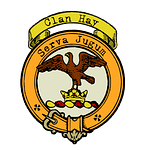Welcome back to A Clan A Day Podcast, brought to you by bagtownclans.com. I’m your host, Colin MacDonald. Today, we’ll be unraveling the history of one of the most fascinating Border Reiver clans in Scottish history, Clan Elliot—a family whose origins are as mysterious as they are significant. With roots stretching back to the early Norman period, the Elliots’ story is deeply intertwined with the turbulent political and social fabric of the Anglo-Scottish Borderlands.
The origins of Clan Elliot are somewhat obscure, with several theories surrounding their name. Some believe the name "Elliot" originated from the village of Eliot in Forfarshire, while others argue that it may have been derived from Breton roots, carried to Scotland by Norman knights during the "Davidian Revolution"—the influx of Norman, Breton, and Flemish nobility under King David I of Scotland. What we do know is that the Elliots became established in the Borders, specifically in Liddesdale, during the early 14th century, likely granted these lands by King Robert the Bruce himself as a reward for their loyalty.
One of the most intriguing aspects of the Elliot history is their initial settlement in the Angus region. Scott of Satchells, a 17th-century antiquarian, claimed that the Elliots originated from a place near Glenshee, where the village of Alyth—then often referred to in medieval documents as "Elieht" or "Eliot"—was located. After the forfeiture of their lands during the Wars of Scottish Independence, they were relocated to Liddesdale, where they became one of the principal Border clans. These early connections to Angus suggest that the Elliots may have been linked to the nobility of the north before their rise to prominence in the Borders.
By the late 15th century, the Elliots were firmly established as one of the dominant families in the Scottish Borderlands, living among other notorious Reiver clans like the Armstrongs and Grahams. Their primary seat became the stronghold of Redheugh, a castle that overlooked the Hermitage Water, built by Robert Ellot, the tenth chief of the clan. From this base, the Elliots participated in the lawless culture of raiding, where both Scottish and English families clashed for control of land and resources.
As Border Reivers, the Elliots became infamous for their raids into both England and Scotland, earning a reputation as fierce warriors and cunning strategists. The rugged terrain of Liddesdale provided the perfect backdrop for this wild, untamed clan. They formed alliances with other Border families but also engaged in fierce feuds. One such feud erupted between the Elliots and the Clan Scott in 1565, resulting in heavy losses on both sides. Despite these violent conflicts, the Elliots maintained their power in the region, further solidifying their place in Scottish history.
The clan’s history took a dramatic turn in the 17th century. With the Union of the Crowns in 1603, the Borders became less of a warzone, and many of the Reiver clans were forcibly pacified. Some, like the Elliots, found new homes and opportunities. Robert Eliott of Redheugh went into exile in Fife, while other branches of the family became entrenched in more peaceful pursuits. By the mid-17th century, Sir Gilbert Eliott of Stobs, a cadet of the Redheugh line, was created a Baronet of Nova Scotia. His descendants would go on to play significant roles in both Scottish and British politics.
One of the most distinguished members of the Elliot family was George Augustus Eliott, the 1st Earl of Minto, who became a celebrated military commander. His defense of Gibraltar in 1782 against the Spanish earned him lasting fame and solidified the Elliots’ reputation as not only warriors but also statesmen and military leaders. The family continued its involvement in politics, with George Eliott’s descendants serving in high offices throughout the British Empire. Notably, the 1st Earl of Minto became Governor-General of India in 1807, a position his grandson would later hold as well, during the era of the Morley-Minto Reforms, which sought to introduce greater political representation in British India.
Another notable figure in the Elliot story is Jane Elliot, sister of the 3rd Baronet of Stobs. She is famous for composing The Flowers of the Forest, a haunting lament commemorating the Scottish soldiers who died at the Battle of Flodden in 1513, including many Elliots. This poignant piece of music has become an enduring part of Scottish cultural heritage, connecting the family not only to politics and warfare but also to the arts.
The Elliots also contributed to Scotland’s religious and intellectual spheres. Gilbert Elliot of Minto, the 1st Baronet, was a staunch supporter of religious liberty and played a pivotal role during the Glorious Revolution. Convicted of high treason in 1685 for his support of religious freedoms, he was later pardoned after the ascension of William of Orange and continued to serve Scotland as a prominent judge.
The legacy of Clan Elliot is far-reaching, from the misty glens of Angus to the windswept hills of Liddesdale, and even to the distant shores of Corsica and India. Today, the Clan Elliot Society continues to honor the history and achievements of this remarkable family. Under the leadership of Margaret Eliott of Redheugh, the 29th Clan Chief, the Elliots remain a proud symbol of resilience, loyalty, and courage.
Thank you for joining us on this exploration of Clan Elliot's history. Be sure to tune in tomorrow for another episode of A Clan A Day Podcast. I’m Colin MacDonald, and as always, Go n-éirí an bóthar leat!











